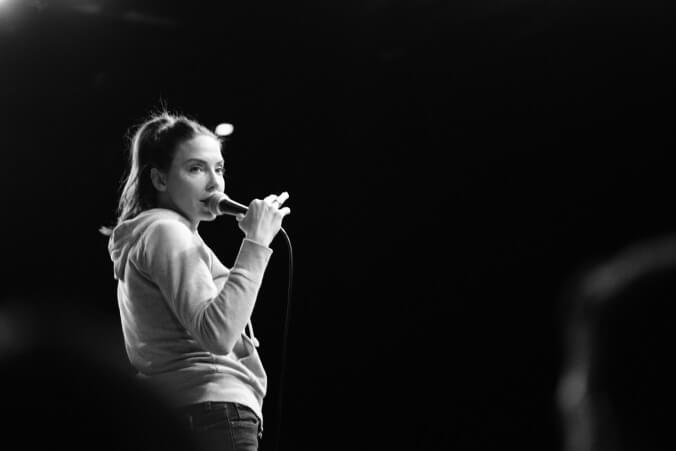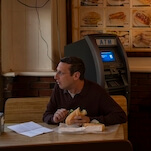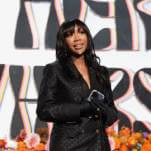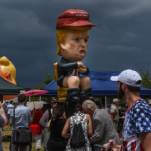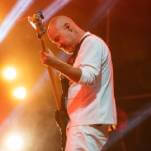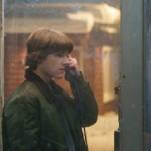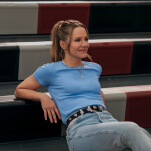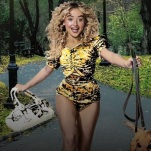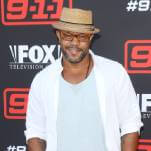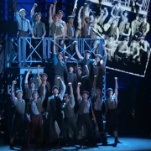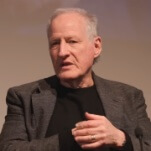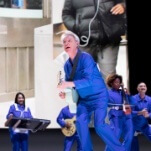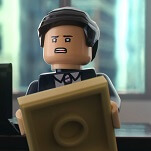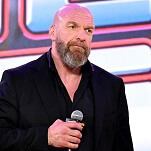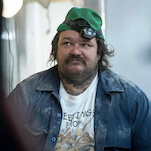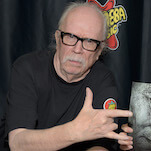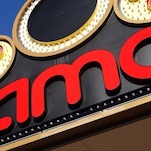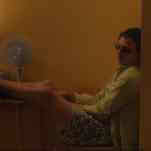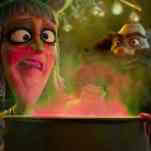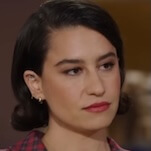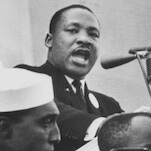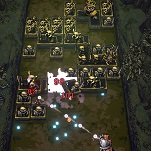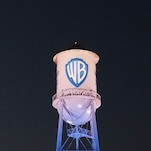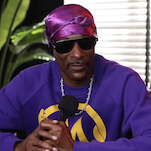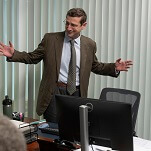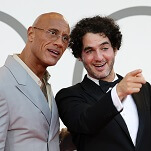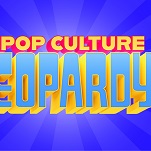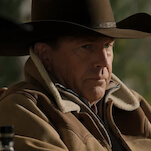Whitney Cummings Photo: Troy Conrad/Showtime
Aspiring stand-up comedian Mike Binder was a fresh-faced teenager from Detroit when he, running late for a make-or-break audition at Los Angeles’ Comedy Store, hopped a fence, ruined his suit, and found himself trying to impress Mitzi Shore. Luckily, his material and unlikely composure impressed the legendary Comedy Store owner and comedy tastemaker—even if, afterward, she confided that his whole ripped suit gimmick had to go.
That story is just one of dozens that make up Binder’s five-part Showtime docuseries about the still-vibrant stand-up destination and launching pad for comedy superstars. From earliest denizens Freddie Prinze, David Letterman, Jimmy Walker, Robin Williams, Roseanne Barr, Andy Kaufman, and Jay Leno to the likes of Jim Carrey, Damon Wayans, Whoopi Goldberg, Sam Kinison, Marc Maron, Sandra Bernhard, Eddie Griffin, Joe Rogan, and Whitney Cummings, the Store has seen them all in its half-century of existence. And, as Binder’s sprawling series relates in interviews and priceless period footage, Mitzi Shore was just as instrumental in shaping American comedy by granting—or peremptorily denying—access to the club’s forbidding rooms.
Co-produced by Mike Tollin, who recently brought us the stellar Last Dance, The Comedy Store similarly tackles a big subject over a long and influential period. Unfortunately, as a filmmaker, Binder (Reign Over Me, Black Or White) doesn’t have The Last Dance director Jason Hehir’s facility with narrative. The Comedy Store is at capacity with comics spinning yarns of The Store’s early days as a feeder to Johnny Carson’s Tonight Show, its spiral into disrepair and disrepute following a labor strike by comedians and Shore’s increasingly erratic leadership, and its current resurgence as one of the most coveted spots for comedians both wannabe and headliner. Like a comedy club roster overstuffed with comics of varying skills and styles, the docuseries never settles into the groove of a single tour de force set.
The stories are great: Letterman, now comfortably settled into his role as bearded comic elder statesman, sits for extended interviews about his abortive attempts to translate Comedy Store success into an ill-advised acting career. Former doorman turned regular Bobby Lee assures an incredulous Binder that, yes, he did once interrupt an after-hours séance where Bob Zmuda and a coven of robed comics tried to summon the late Andy Kaufman’s spirit. But The Comedy Store never finds a way to tie all these individuals and their stories into a cohesive portrait. Hopping back and forth through the club’s tumultuous history in the four episodes available for review, Binder’s undeniably watchable series sets out to craft monuments to a place and a woman he reveres equally. But it’s an act of lionization that does far more telling than showing, with Binder’s penchant for deadening episode-beginning podcast reminiscences and mawkish, somberly scored, tragedy-milestone endings lurching from great story to great story without ever sharpening the series’ focus on just what made The Comedy Store unique among its comic club peers.
What uniqueness does come through is in the series’ patchwork portrait of Shore, whose comedy and business acumen, for better or sometimes worse, was inseparable from the club itself. Described by frequent tale-spinner Marc Maron as a “dark, weird mother figure,” Shore, who inherited the club in her divorce from longtime comedian spouse Sammy Shore in 1972, emerges as an entrepreneur of capricious taste and ferocious loyalty. That combination saw her nurturing future show business icons like Letterman, Leno, and her one, true favorite Richard Pryor, while writing off others. An unimpressed Tiffany Haddish recalls her failed audition in which Shore told her bluntly, “You’re too pretty to be funny,” while early favorite Damon Wayans explains how his exodus from The Store was precipitated by Shore’s plans to rechristen the comic “Pepper” in a mismatched doubles act with white comic Joey Camen (“Salt”).
But The Comedy Store fairly glows with admiration for the pioneering Shore, each comic invariably slipping into an affectionate approximation of Shore’s ever-present nasal whine. While almost every comic also occasionally questions Shore’s decision-making before her death in 2018, they also note how, in the infamously cutthroat backstage hallways of the club, even the most macho of insult comics fawned over a diminutive middle-aged woman who held their careers in her hands. (Shore also, in 1978, opened up the club’s Belly Room, an all-woman stand-up space at a time when female comedians were perpetually overlooked on the scene.)
The closest the series comes to pinning down what made The Comedy Store so instrumental in comics’ careers comes from grateful performers like Carrey who explains how, after plateauing as an impressionist, he reinvented himself in ways that often left audiences (and Shore) perplexed and angry. “She was a little resistant, but she didn’t stop me,” Carrey says after relating how he abruptly ditched his crowd-pleasing gimmick for alienating improv, a sentiment echoed by the late John Witherspoon, who said of Shore’s faith in the instincts of those she deemed worthy, “She’s gonna push you until you stop yourself.”
Binder’s series is at its worst when addressing those comics (like Rogan, Joey Diaz, and longtime late-night fixture Brian Holtzman) whose deliberately abrasive and controversy-courting acts are presented in hazy “no safe spaces” clichés. Episodes are broken, without much plan, into mini-segments on various events and comics, each promising more enlightenment about The Comedy Store’s overall themes than they invariably deliver. Binder takes a long look at Andrew Dice Clay’s abortive Saturday Night Live hosting gig and settles into Clay’s career-long explanation that his sexist, racist, homophobic stage character is the butt of the joke, sidestepping the fact that a large percentage of Dice’s unprecedentedly huge arena crowds in his heyday weren’t there for a deconstruction of toxic masculinity. When a leather-jacketed Clay responds to one heckler’s objection to his gay jokes with “Get a job, buttslammer,” it’s shown playing to a whooping crowd. Similarly, Rogan’s role as undeniably influential podcaster and self-appointed joke-thief vigilante is presented more as chummy admiration (Binder credits Rogan’s return as instrumental in The Store’s 2010s revitalization) than insightful examination of how comedy’s boundary-testing isn’t, simply by virtue of existence, automatically worthwhile. Maron, explaining his absence from the club when it was at its lowest, says, “The one thing I used to know about this place is, if you got a bunch of hateful fucking monsters up onstage, the darkness in the building celebrates.”
While it’s tempting to say that The Comedy Store’s shaggy, undisciplined history should be shorter, there are those stories: The cocaine-fueled demise of Prinze (who once dragooned Walker on a mission to shoot rival teen idol John Travolta with a crossbow) and the adjacent suicide of strike-blackballed comic Steve Lubetkin are especially riveting, along with Sam Kinison’s messianic rise and fall, culminating with a harrowing story of his car crash death in the arms of comedian Carl LaBove. But The Comedy Store will endure mainly as a bountiful, anecdotal chronicle of a place where generations of American comedians converged to see if their oblique, individualistic views of the world would find a home. It’s Howie Mandel, of all people, who spins the most evocative winner, a spellbinding reminiscence of the night Richard Pryor showed up unannounced, solemnly proclaimed himself God, and did a single, extended piece of virtuoso character work that left the Comedy Store crowd and comics marveling in what can only, in Mandel’s telling, be described as awe. A place that makes such nights possible is worth plenty of off nights.
